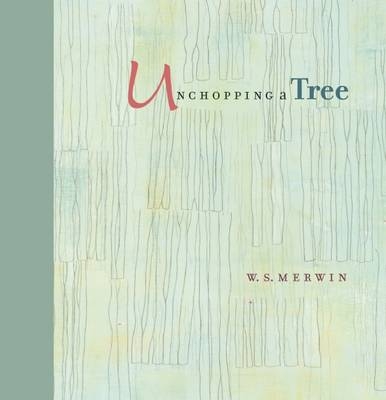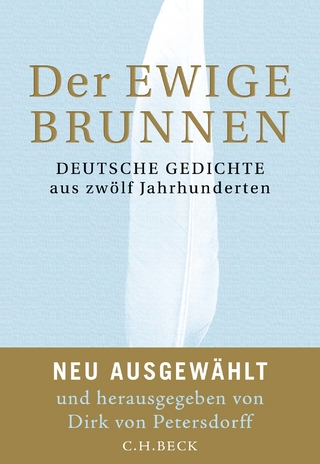
Unchopping a Tree
Trinity University Press,U.S. (Verlag)
978-1-59534-187-7 (ISBN)
- Keine Verlagsinformationen verfügbar
- Artikel merken
There's no mystery to chopping down a tree. But how do you put back together a tree that's been felled? Mystical instructions are required, and that's what W. S. Merwin provides in his prose piece "Unchopping a Tree," appearing for the first time in a self-contained volume. Written with a poet's grace, an ecologist's insights, and a Buddhist's reverence for life, this elegant work describes the difficult, sacred job of reconstructing a tree. Step by step, page by page, with Merwin's humble authority, secrets are revealed, and the destroyed tree rises from the forest floor. Unchopping a Tree opens with simplicity and grace: "Start with the leaves, the small twigs, and the nest that have been shaken, ripped, or broken off by the fall; these must be gathered and attached once again to their respective places." W. S. Merwin, like many conservationists, is quick to say: "When we destroy the so-called natural world around us we're simply destroying ourselves. And I think it's irreversible." Thus the tree takes on a scale that begs the reader's compassion, and one tree is a parable for the restoration of all nature.
W. S. Merwin (1927-2019), poet, translator, and environmental activist, was one of the most widely read--and imitated--poets in America. The son of a Presbyterian minister, whom he began writing hymns for at the age of five, Merwin went to Europe as a young man and developed a love of languages that led to work as a literary translator. Over the years his poetic voice has moved from the more formal and medieval--influenced somewhat by Robert Graves and the medieval poetry he was then translating--to a more distinctly American voice, following his two years in Boston where he got to know Robert Lowell, Sylvia Plath, Ted Hughes, Adrienne Rich, and Donald Hall, all of whom were breaking out of the rhetoric of the 1950s. Merwin's recent poetry is perhaps his most personal, arising from his deeply held beliefs. He is not only profoundly anti-imperialist, pacifist, and environmentalist but also possessed by an intimate feeling for landscape and language and the ways land and language interflow. His latest poems are densely imagistic and full of an intimate awareness of the natural world. His first book, A Mask for Janus, was chosen by W. H. Auden in 1952 for the Yale Younger Poets Prize. The Carrier of Ladders received the 1970 Pulitzer Prize. Among his other books of poems are The Drunk in the Furnace, The Moving Target, The Lice, Flower & Hand, The Compass Flower, Feathers from the Hill, Opening the Hand, The Rain in the Trees, Travels, The Vixen, The Lost Upland, Unframed Originals, The Folding Cliffs, The River Sound, The Pupil, a translation of Dante's Purgatorio the critically lauded translation of Sir Gawain and the Green Knight, as well as Present Company, which won the Rebekah Johnson Bobbitt National Prize for Poetry, Migration: Selected Poems 1951-2001, which won the National Book Award, and The Shadow of Sirius, which received the Pulitzer Prize (Merwin's second). A two-volume set, The Collected Poems of W. S. Merwin, was published in May 2013. Merwin's prose includes The Mays of Ventadorn, part of the National Geographic Directions series, The Ends of the Earth (essays), and the memoir Summer Doorways. Recent reissues of his books are The First Four Books of Poems, Spanish Ballads, translations of Jean Follain's poetry collection Transparence of the World and Antonio Porchia's Voices, and The Book of Fables, a reissue of (The Miner's Pale Children and Houses and Travelers). Forthcoming are the poetry collection Before Morning (Copper Canyon, April 2014) and a booklength essay, Unchopping a Tree (Trinity University Press, March 2014). Merwin was named poetry consultant to the Library of Congress in 1999, along with poets Rita Dove and Louise Gluck. He has been honored as laureate of the Struga Poetry Evenings Festival in Macedonia and as recipient of the international Golden Wreath Award, the 2004 Lannan Lifetime Achievement Award, the Pulitzer Prize (twice), the National Book Award, the Tanning Prize, the Bollingen Prize, the Ruth Lilly Poetry Prize, and the first Zbigniew Herbert International Literary Award, in 2013. He was appointed U.S. poet laureate in 2010. Merwin has spent the last thirty years planting nineteen acres with over 800 species of palm, creating a sustainable forest; the property recently became the Merwin Conservancy (http: //www.merwinconservancy.org).
| Erscheint lt. Verlag | 13.3.2014 |
|---|---|
| Illustrationen | Liz Ward |
| Zusatzinfo | Illustrations, unspecified |
| Verlagsort | San Antonio |
| Sprache | englisch |
| Themenwelt | Literatur ► Lyrik / Dramatik ► Lyrik / Gedichte |
| Sachbuch/Ratgeber ► Natur / Technik ► Natur / Ökologie | |
| Naturwissenschaften ► Biologie ► Ökologie / Naturschutz | |
| ISBN-10 | 1-59534-187-0 / 1595341870 |
| ISBN-13 | 978-1-59534-187-7 / 9781595341877 |
| Zustand | Neuware |
| Haben Sie eine Frage zum Produkt? |
aus dem Bereich


